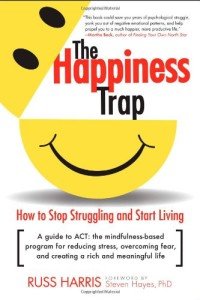 I lead an every-other-month book club at Menu for Change, and our most recent book pick was Russ Harris’ The Happiness Trap: How to Stop Struggling and Start Living. I’d had the book on my shelf for over a year and had not had a chance to read it, so pushing it as a book club pick was a partly selfish move on my part. But not really, because the reason I bought it in the first place was the recommendations from colleagues who work with patients who struggle with emotional eating, anxiety, eating disorders, and so on. Their recommendations were spot-on.
I lead an every-other-month book club at Menu for Change, and our most recent book pick was Russ Harris’ The Happiness Trap: How to Stop Struggling and Start Living. I’d had the book on my shelf for over a year and had not had a chance to read it, so pushing it as a book club pick was a partly selfish move on my part. But not really, because the reason I bought it in the first place was the recommendations from colleagues who work with patients who struggle with emotional eating, anxiety, eating disorders, and so on. Their recommendations were spot-on.
 The book is based on Acceptance and Commitment Therapy (ACT), which that focuses on accepting unhelpful thoughts (such as “I’m a failure”) rather than trying to control those thoughts (in other words, ACT never suggests “try to think positively,” in part because positive thoughts aren’t always helpful thoughts). By simply noticing our unhelpful thoughts and accepting them as just words rather than “fusing” with our thoughts and treating them as reality, we struggle less and are able to live more meaningful lives.
The book is based on Acceptance and Commitment Therapy (ACT), which that focuses on accepting unhelpful thoughts (such as “I’m a failure”) rather than trying to control those thoughts (in other words, ACT never suggests “try to think positively,” in part because positive thoughts aren’t always helpful thoughts). By simply noticing our unhelpful thoughts and accepting them as just words rather than “fusing” with our thoughts and treating them as reality, we struggle less and are able to live more meaningful lives.
The book’s content progressively builds, starting with simple strategies to defuse the power our thoughts often have over us by recognizing them for what they are (again, just words). Yes, there are “exercises,” but most of them take around 30 seconds to complete. I practiced them myself, as did my patients, and they were quite effective. The book moves on to mindfulness and finally to more in-depth (but worthwhile) exercises for identifying your values –what’s really important to you. This is important, because ACT is all about acting in accordance with your values–what you want to do with your life, and how you want to do it. I like that Harris really clarifies the distinction between values and goals (we often think we are identifying a value but really it’s a goal), and talks about how goal-setting is important in its own right.
Harris makes it clear that ACT is not a spiritual belief system or path to enlightenment, and the mindfulness exercises are not meditation (although he mentions a few resources for those who are interested in meditation). As for the exercises that dot the book at regular intervals? Try them out, keep the ones that work for you and leave the rest behind.
Who is this book for? For anyone who struggles with emotional eating, feelings of failure (about food/dieting or for other reasons), or simply finds themselves mired in their own thoughts/worries/fears about the past or the future, and unable to fully appreciate the present. This book can help you escape the “butterflies and rainbows” idea of happiness, and instead move toward the deeper, more subtle happiness that comes from living a meaningful life, connected to what’s most important to you.
Note: You can download the first chapter of the book for free from the author’s website.






